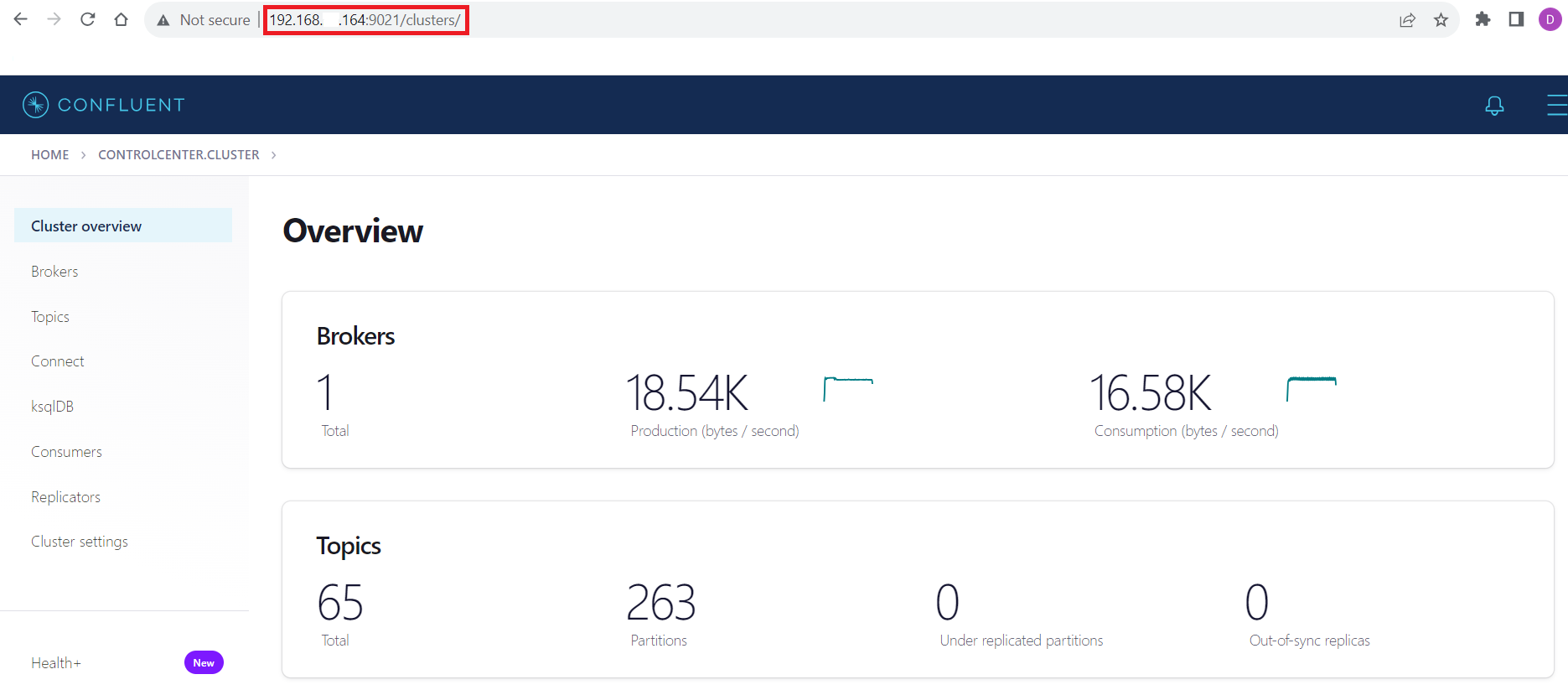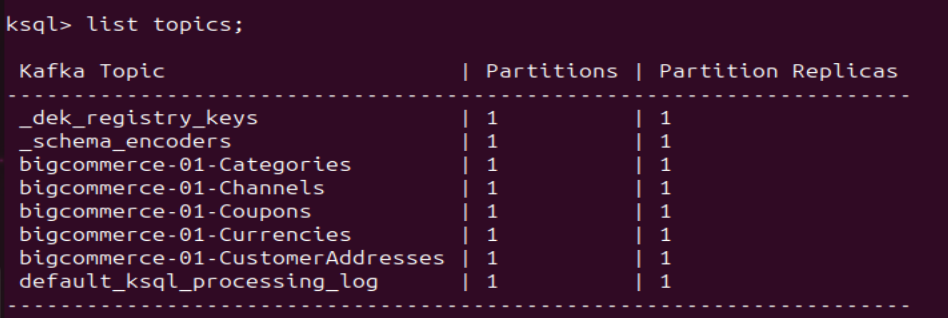Discover how a bimodal integration strategy can address the major data management challenges facing your organization today.
Get the Report →Stream IBM Cloud Object Storage Data into Apache Kafka Topics
Access and stream IBM Cloud Object Storage data in Apache Kafka using the CData JDBC Driver and the Kafka Connect JDBC connector.
Apache Kafka is an open-source stream processing platform that is primarily used for building real-time data pipelines and event-driven applications. When paired with the CData JDBC Driver for IBM Cloud Object Storage, Kafka can work with live IBM Cloud Object Storage data. This article describes how to connect, access and stream IBM Cloud Object Storage data into Apache Kafka Topics and to start Confluent Control Center to help users secure, manage, and monitor the IBM Cloud Object Storage data received using Kafka infrastructure in the Confluent Platform.
With built-in optimized data processing, the CData JDBC Driver offers unmatched performance for interacting with live IBM Cloud Object Storage data. When you issue complex SQL queries to IBM Cloud Object Storage, the driver pushes supported SQL operations, like filters and aggregations, directly to IBM Cloud Object Storage and utilizes the embedded SQL engine to process unsupported operations client-side (often SQL functions and JOIN operations). Its built-in dynamic metadata querying allows you to work with and analyze IBM Cloud Object Storage data using native data types.
Prerequisites
Before connecting the CData JDBC Driver for streaming IBM Cloud Object Storage data in Apache Kafka Topics, install and configure the following in the client Linux-based system.
- Confluent Platform for Apache Kafka
- Confluent Hub CLI Installation
- Self-Managed Kafka JDBC Source Connector for Confluent Platform
Define a New JDBC Connection to IBM Cloud Object Storage data
- Download CData JDBC Driver for IBM Cloud Object Storage on a Linux-based system
- Follow the given instructions to create a new directory extract all the driver contents into it:
- Create a new directory named IBM Cloud Object Storage
mkdir IBMCloudObjectStorage - Move the downloaded driver file (.zip) into this new directory
mv IBMCloudObjectStorageJDBCDriver.zip IBMCloudObjectStorage/ - Unzip the CData IBMCloudObjectStorageJDBCDriver contents into this new directory
unzip IBMCloudObjectStorageJDBCDriver.zip
- Create a new directory named IBM Cloud Object Storage
- Open the IBM Cloud Object Storage directory and navigate to the lib folder
ls cd lib/ - Copy the contents of the lib folder of IBM Cloud Object Storage into the lib folder of Kafka Connect JDBC. Check the Kafka Connect JDBC folder contents to confirm that the cdata.jdbc.ibmcloudobjectstorage.jar file is successfully copied into the lib folder
cp * ../../confluent-7.5.0/share/confluent-hub-components/confluentinc-kafka-connect-jdbc/lib/ cd ../../confluent-7.5.0/share/confluent-hub-components/confluentinc-kafka-connect-jdbc/lib/ - Install the CData IBM Cloud Object Storage JDBC driver license using the given command, followed by your Name and Email ID
java -jar cdata.jdbc.ibmcloudobjectstorage.jar -l - Enter the product key or "TRIAL" (In the scenarios of license expiry, please contact our CData Support team)
- Start the Confluent local services using the command:
confluent local services startThis starts all the Confluent Services like Zookeeper, Kafka, Schema Registry, Kafka REST, Kafka CONNECT, ksqlDB and Control Center. You are now ready to use the CData JDBC driver for IBM Cloud Object Storage to stream messages using Kafka Connect Driver into Kafka Topics on ksqlDB.
![Start the Confluent local services Start the Confluent local services]()
- Create the Kafka topics manually using a POST HTTP API Request:
curl --location 'server_address:8083/connectors' --header 'Content-Type: application/json' --data '{ "name": "jdbc_source_cdata_ibmcloudobjectstorage_01", "config": { "connector.class": "io.confluent.connect.jdbc.JdbcSourceConnector", "connection.url": "jdbc:ibmcloudobjectstorage:ApiKey=myApiKey;CloudObjectStorageCRN=MyInstanceCRN;Region=myRegion;OAuthClientId=MyOAuthClientId;OAuthClientSecret=myOAuthClientSecret;", "topic.prefix": "ibmcloudobjectstorage-01-", "mode": "bulk" } }'Let us understand the fields used in the HTTP POST body (shown above):
- connector.class: Specifies the Java class of the Kafka Connect connector to be used.
- connection.url: The JDBC connection URL to connect with IBM Cloud Object Storage data.
Built-in Connection String Designer
For assistance in constructing the JDBC URL, use the connection string designer built into the IBM Cloud Object Storage JDBC Driver. Either double-click the JAR file or execute the jar file from the command-line.
java -jar cdata.jdbc.ibmcloudobjectstorage.jarFill in the connection properties and copy the connection string to the clipboard.
Register a New Instance of Cloud Object Storage
If you do not already have Cloud Object Storage in your IBM Cloud account, follow the procedure below to install an instance of SQL Query in your account:
- Log in to your IBM Cloud account.
- Navigate to the page, choose a name for your instance and click Create. You will be redirected to the instance of Cloud Object Storage you just created.
Connecting using OAuth Authentication
There are certain connection properties you need to set before you can connect. You can obtain these as follows:
API Key
To connect with IBM Cloud Object Storage, you need an API Key. You can obtain this as follows:
- Log in to your IBM Cloud account.
- Navigate to the Platform API Keys page.
- On the middle-right corner click "Create an IBM Cloud API Key" to create a new API Key.
- In the pop-up window, specify the API Key name and click "Create". Note the API Key as you can never access it again from the dashboard.
Cloud Object Storage CRN
If you have multiple accounts, you will need to specify the CloudObjectStorageCRN explicitly. To find the appropriate value, you can:
- Query the Services view. This will list your IBM Cloud Object Storage instances along with the CRN for each.
- Locate the CRN directly in IBM Cloud. To do so, navigate to your IBM Cloud Dashboard. In the Resource List, Under Storage, select your Cloud Object Storage resource to get its CRN.
Connecting to Data
You can now set the following to connect to data:
- InitiateOAuth: Set this to GETANDREFRESH. You can use InitiateOAuth to avoid repeating the OAuth exchange and manually setting the OAuthAccessToken.
- ApiKey: Set this to your API key which was noted during setup.
- CloudObjectStorageCRN (Optional): Set this to the cloud object storage CRN you want to work with. While the connector attempts to retrieve this automatically, specifying this explicitly is recommended if you have more than Cloud Object Storage account.
When you connect, the connector completes the OAuth process.
- Extracts the access token and authenticates requests.
- Saves OAuth values in OAuthSettingsLocation to be persisted across connections.
![Using the built-in connection string designer to generate a JDBC URL (Salesforce is shown.) Using the built-in connection string designer to generate a JDBC URL (Salesforce is shown.)]()
- topic.prefix: A prefix that will be added to the Kafka topics created by the connector. It's set to "ibmcloudobjectstorage-01-".
- mode: Specifies the mode in which the connector operates. In this case, it's set to "bulk", which suggests that the connector is configured to perform bulk data transfer.
This request adds all the tables/contents from IBM Cloud Object Storage as Kafka Topics.
Note: The IP Address (server) to POST the request (shown above) is the Linux Network IP Address.
- Run ksqlDB and list the topics. Use the commands:
ksql list topics;![List the Kafka Topics (BigCommerce is shown) List the Kafka Topics (BigCommerce is shown)]()
- To view the data inside the topics, type the SQL Statement:
PRINT topic FROM BEGINNING;
Connecting with the Confluent Control Center
To access the Confluent Control Center user interface, ensure to run the "confluent local services" as described in the above section and type http://<server address>:9021/clusters/ on your local browser.

Get Started Today
Download a free, 30-day trial of the CData JDBC Driver for IBM Cloud Object Storage and start streaming IBM Cloud Object Storage data into Apache Kafka. Reach out to our Support Team if you have any questions.








